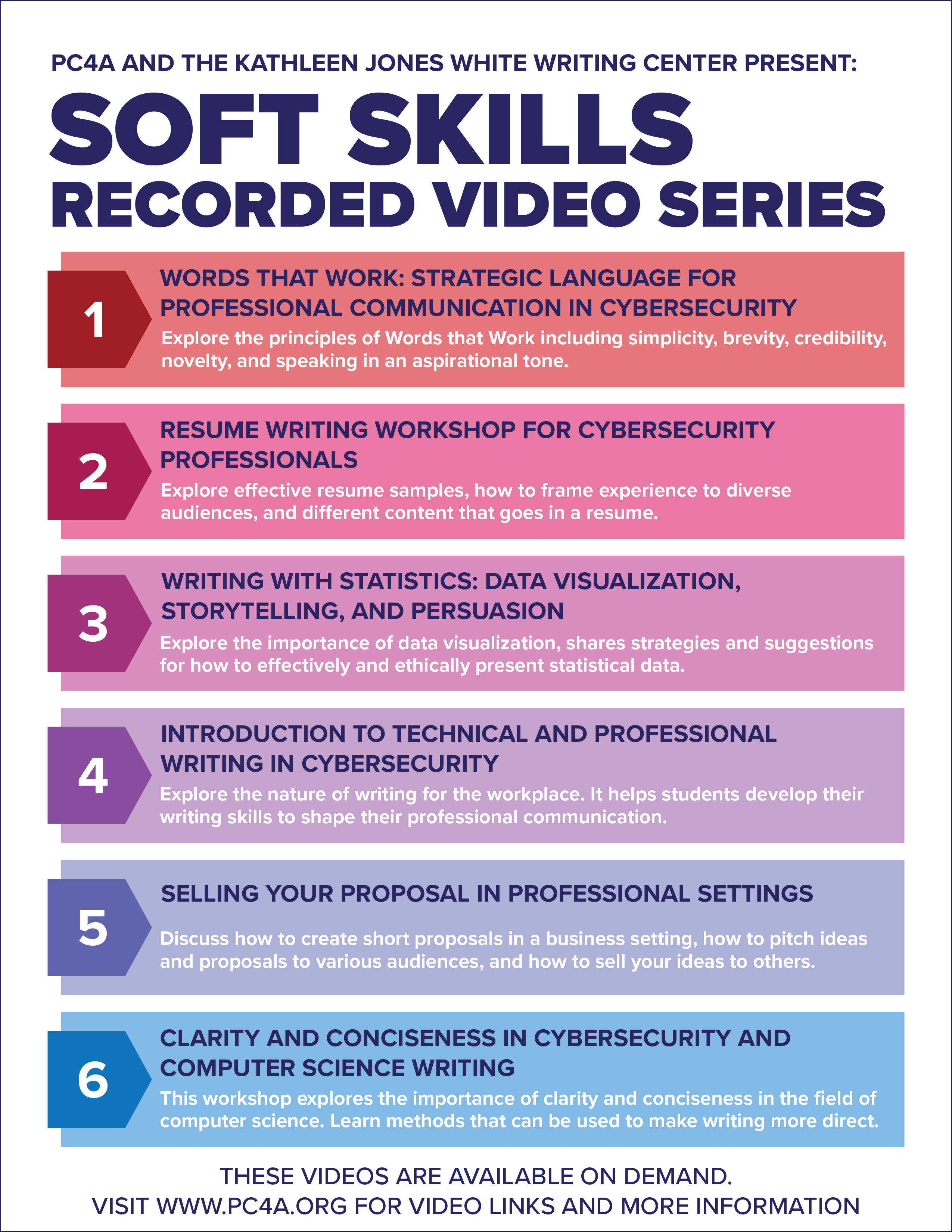About PC4A | In the News | Student Resources | Partner Pages | Grant Activities | Project Documents | Grant Progress | Faculty Development | DoD/DIB Outreach
Soft skills are vital to success in all fields. Use the resources below to improve your soft skills, and view our soft skills video series!
Soft Skills Video Series
Offered on-demand by the IUP Writing Center, the videos below cover a variety of important topics that help students become better prepared for the workforce. Contact w-center@iup.edu for more information. Download the flyer.
Words that Work: Strategic Language for Professional Communication in Cybersecurity
A workshop based on the book Words that Work: It’s Not What You Say, It’s What People Hear by Frank Luntz. This workshop explores the principles of Words that Work, including simplicity, brevity, credibility, novelty, and speaking in an aspirational tone, and gives students a chance to practice each of the principles. The workshop concludes by exploring how the strategic choice of words can be an asset in professional communication within cybersecurity and computer science settings.
Résumé Writing Workshop for Cybersecurity Professionals
This workshop introduces students to developing the content and designing an effective résumé. We explore effective résumé samples, how to frame experience to diverse audiences, and the different content that goes into a résumé. Students also can learn new features in MS Word that will make their résumé distinctive. Students can get started on one during this workshop or polish what they've already written.
Writing with Statistics: Data Visualization, Storytelling, and Persuasion
Twenty-first-century workplace contexts require effective communication skills, and in the digital age, these skills include how to use statistics and numbers to tell stories to potential customers or the public. This workshop explores the importance of data visualization, shares strategies and suggestions for how to effectively and ethically present statistical data in both written and visual formats, and how to use these effectively for informative and persuasive purposes.
Introduction to Technical and Professional Writing in Cybersecurity
This workshop introduces students to the nature of writing in and for the workplace. It helps students develop their writing skills to shape their professional communication. With practical examples and engaging activities, students learn different styles, structures, and organizations of professional and technical writing genres. During the workshop, students learn about multimodal and digital ways of composing in technical and professional contexts.
Selling your Proposal in Professional Settings
Proposals of ideas, new approaches, or new products are how you can make change. This workshop introduces students to how to write innovative short proposals to create change in their organizations and beyond. This workshop will discuss how to create short proposals in a business setting, how to pitch ideas and proposals to various audiences, and how to sell your ideas to others. This hands-on workshop will include proposal pitching and practice.
Clarity and Conciseness in Cybersecurity and Computer Science Writing
This workshop explores the critical importance of clarity and conciseness in the field of computer science. Specifically, the workshop introduces students to the paramedic method, a method that can be used at the sentence and paragraph level to make writing more direct, active, and precise. We’ll also explore purpose and audience-driven strategies for clarity and conciseness that can be used to reduce wordiness and provide clarity.
Help Sheets for Improving Writing Skills
Recorded Presentations
- Citing sources using MLA style
- Citing sources using APA style
- Sample paper in APA style
- Using formal vs. informal language
- Writing balanced sentences
- Correcting for subject-verb agreement
- Proofreading your writing
- Writing for your audience
- Avoiding Plagiarism
- Correcting Fragments, Run-Ons, and Comma Splices
- Writing effective introductions
- Using inclusive language
- Revising passive voice
- Planning a Problem-Solution Essay
- Writing thesis statements
- Using transitional words and phrases
- Understanding Grammarly
- Grammarly flaws
- Tone in Emails
- Conveying Technical Information in Email
- Identifying Technical Language
- Email Etiquette
- Email for cybersecurity
- Parts of an Abstract
- Anatomy of an Abstract
- Responding to Writing
- Anatomy of a Memo
- Making strong recommendations
- Introduction to using the Writing Center
- APA Style
- MLA Style
- Communicating With Professors
- Writing Professional Memos and Emails
- Tone in Emails
- Email Etiquette
- Abstracts in Context
- Responding to Writing
- Memos in the Workplace
- Writing recommendation reports that work
- Proofreading
- Rhetorical Situation
- Understanding the assignment
 The PC4A Project is proudly funded by DoD STEM.
The PC4A Project is proudly funded by DoD STEM.
Visit dodstem.us to learn more about the work they are doing to inspire, cultivate, and develop exceptional STEM talent through a continuum of opportunities to enrich our current and future DoD workforce.
Any opinions, findings, and conclusions or recommendations expressed in this material are those of the author(s) and do not necessarily reflect the views of the Office of Naval Research.
